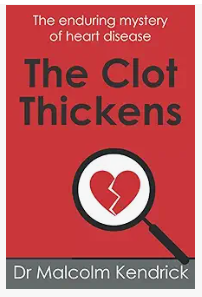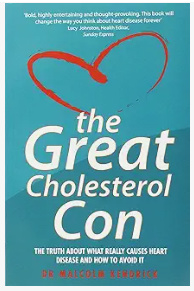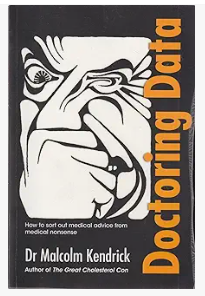Dr Malcolm Kendrick explains why LDL cannot be causal in CVD. And what is a much more likely cause and mechanism. Very detailed scientific/medical explanation, so be patient!
Anyone worried about high LDL should watch this…
Haven’t been able to watch, but his 50+ posts or blog series on heart disease makes the most sense to me. If this is like that, it should be great.
I told my doctor that I wasn’t going to take the cholesterol medication because it worse for me than my slightly high LDL. His comment floored me. He said he understood but the system requires him to push it. It is like they know it isn’t an issue but they are just force people to pay for it anyway. I see it as money grab.
It’s been a well known fact that LDL cholesterol has nothing to do with heart disease but is actually good for your metabolic health. It’s also a well known fact that Big Pharma is controlling the medical community for profits. Statins are a billion dollar a year industry. Too much money and greed involved to let the truth out.
@Alecmcq Thanks for sharing this. I would’ve watched it, but no, since I’m not worried about high LDL, I didn’t bother 
But I’m a big Kendrick fan, having read several of his books. He’s a prolific writer on this and related topics and his writings are highly informative and a lot of fun…



Doctoring Data is especially worth one’s time. It’ll make you laugh and cry.
Which country are you in Chuck? I am in the UK and it seems to be the same story regarding chucking statins at people for virtually no reason!
I am in the USA, this whole country from the politicians down are all money grabbing criminals.
@ctviggen tv You may want to listen specifically to minute 55 through hour 10 when Malcolm explains why he thinks LP(a) is more atherogenic from a mechanistic standpoint. Essentially, it boils down to part of the immune response, and not causal, like regular LDL, but more difficult to remove and therefore in essence it would be a larger risk factor, again like LDL, but only in a circumstance whereby you have a lot of damage causing clotting. Interesting.
Thanks for the link @Alecmcq
This is where I disagree with him, as I have extremely high Lp(a) and yet a zero score on CAC. There’s no way to reconcile these. (If Lp(a) is CAUSAL for atherosclerosis, then EVERYONE with high Lp(a) should have atherosclerosis. If there is a single person – like me – who does not, then Lp(a) is not causal.)
And it’s immaterial anyway, because there’s no way to reduce Lp(a) (but the drug companies are working on it), at least not to the extent I’d have to reduce mine.
It’s definitely bigger … whether it’s worse is open to debate.
When it comes to worser vs worst, it’s clearly a contender. 
This is wrong. Many people who smoke cigarettes do not get cancer. Do you conclude cigarette smoking does not cause cancer? Chronic (and even infectious) disease is multifactorial. You’re confusing necessary and sufficient cause. It’s hard to identify sufficient cause for chronic disease.
Dr Chaffee following up with a very brief analysis of the cholesterol literature and studies
That’s not how I heard it. He was saying that it’s part of the repair, not causing the damage. In fact, Dr. Kendrick spent most of the seventy minutes debunking the idea that any lipoprotein or any form of cholesterol has any role in the causation of atherosclerosis.
Yes, LP(a) makes it difficult to eventually dissolve the clot later on, but it doesn’t cause any of the damage that makes it necessary for the clot to form in the first place. You can cut your skin with a knife, and a scab will form. What are you going to assign as the cause of the scab, the fibrin in the clot, or the knife wound?
As you mention, Dr. Kendrick points out that when the rate of damage is low enough, atheromas do not form. It’s only when the rate of damage is too great for the body to keep up with it that we see atherosclerosis. Ravnskov and Diamond have also posited that in their published work.
I guess I did not word things well, because what you described was my intended message. However, being harder to dissolve does make it more atherogenic even if it is part of the healing process. Being harder to dissolve gives it a higher chance of contributing to stenosis if and when the damage outpaces the healing. Whether it is LPa or LDL is part of the healing process, either would be an accelerant towards plaque accumulation, with neither being the cause. In this way you can have a log linear relationship between population level ldl, but yet not have ldl as the initial cause.
While it is true that a positive correlation does nothing to establish causality, a negative correlation is sufficient proof of a lack of causality. The fact that a large majority of people presenting in the emergency room with their first heart attack have normal or even low LDL, for example, is a pretty good indication that whatever caused their heart attack, it was not their LDL level.
With tobacco smoke and cancer, Austin Bradford-Hill stated that the fact of an association between smoking and lung cancer was not by itself sufficient to establish causality. However, he felt that, given the criteria he developed, it was pretty safe to draw that conclusion. The obvious way to establish causality wold have been to conduct randomised controlled trials, but there are ethical and practical difficulties that militate against conducting such trials, hence his famous criteria, which the data surrounding saturated fat, cholesterol, lipoproteins, and particle sizes, etc., don’t come anywhere near meeting.
At best, we might conclude that lipid numbers are a marker for cardiovascular disease, but manipulating a marker does nothing to heal or prevent the disease. You can take all the anti-coagulants you want, but they won’t stop you from skinning your knee in a fall, or getting knifed in a fight. In fact, they will make recovery from such events more difficult.
Anyone want to posit on why the cost of a statin is, at least for my husband, $0.00? Even his generic metformin has a copay of $5, but the statin is free. I am convinced that there is a non-health reason statins are prescribed like candy these days, but I don’t see a direct correlation between statin prescriptions and profit. Any ideas? Patent expiration?
